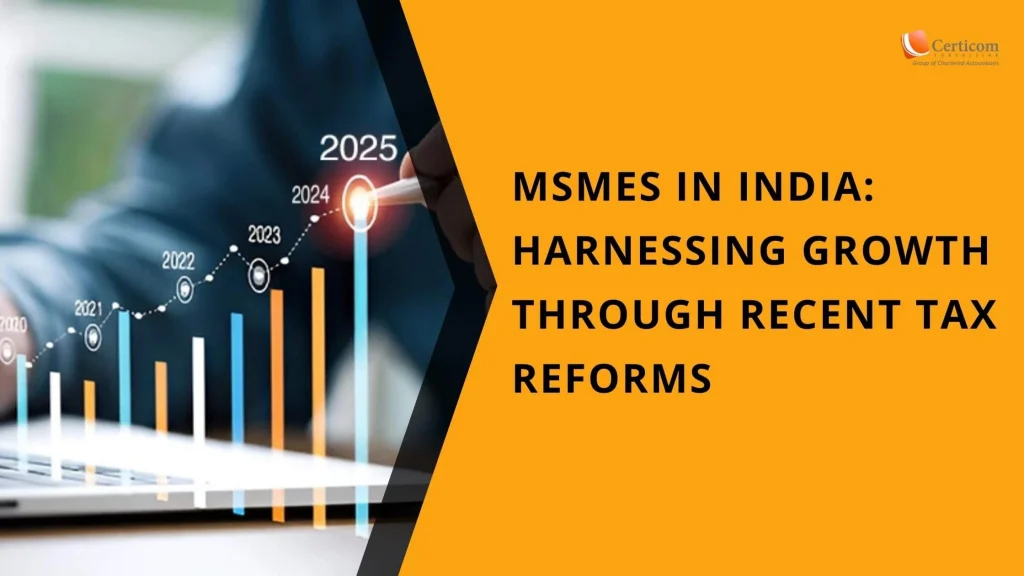MSMEs in India: Harnessing Growth through Recent Tax Reforms

Micro, Small, and Medium Enterprises (MSMEs) form the backbone of India’s economy, contributing significantly to employment, innovation, and economic development. With over 63 million enterprises, MSMEs account for nearly 30% of the country’s GDP and over 45% of total manufacturing output. Their role in fostering entrepreneurship, reducing regional disparities, and strengthening exports is crucial. However, they face persistent challenges, including restricted access to finance, inadequate infrastructure, and regulatory complexities. To address these issues, the Indian government has introduced various tax reforms aimed at simplifying compliance, reducing tax liabilities, and promoting formalization.
Understanding MSMEs and Their Classification
As per the Micro, Small & Medium Enterprises Development (MSMED) Act, 2006, MSMEs are categorized based on their investment and turnover:
Micro Enterprises: Investment up to ₹1 crore and turnover up to ₹5 crore.
Small Enterprises: Investment up to ₹10 crore and turnover up to ₹50 crore.
Medium Enterprises: Investment up to ₹50 crore and turnover up to ₹250 crore.

The Purpose of Tax Reforms
Tax reforms involve significant modifications to tax structures, regulations, and administrative frameworks. Their primary objectives include:
Enhancing Revenue Generation: Broadening the tax base ensures sustainable revenue for public services and infrastructure.
Boosting Economic Growth: Lower tax rates and incentives encourage business expansion and investment.
Ensuring Fair Taxation: Adjusting brackets and deductions promotes an equitable system.
Simplifying Compliance: Reducing administrative burdens for businesses and tax authorities.
Encouraging Voluntary Compliance: A transparent and efficient tax system increases adherence.
Adapting to Market Changes: Tax policies evolve to reflect economic and technological advancements.
Key Tax Reforms and Their Impact on MSMEs
1. Goods and Services Tax (GST) Implementation (2017)
GST replaced multiple indirect taxes, streamlining the tax structure and eliminating cascading effects. However, frequent regulatory changes, compliance costs, and the need for digital adoption pose challenges for MSMEs.
2. Corporate Tax Reduction (2019)
The reduction of corporate tax rates from 30% to 22% for existing firms and 15% for new manufacturing businesses has enhanced cash flow, allowing MSMEs to reinvest in growth and competitiveness.
3. Presumptive Taxation Scheme (Section 44AD)
MSMEs with an annual turnover of up to ₹2 crore can declare income at a fixed rate (8% for cash transactions and 6% for digital transactions). This scheme reduces compliance efforts by eliminating detailed bookkeeping and audit requirements.
4. Higher GST Registration Threshold
The GST exemption limit was increased from ₹20 lakh to ₹40 lakh for goods-based businesses, relieving many MSMEs from mandatory registration. For service providers, the threshold remains at ₹20 lakh.
5. Udyam Registration and Financial Support
Launched in 2020, Udyam Registration simplifies MSME registration, enabling access to tax benefits and priority sector lending, thereby improving financial stability.
6. Incentives for Digital Transactions
Eligible start-ups receive a tax holiday for three years within their first ten years of incorporation. Angel tax exemptions further support funding and expansion.
7. Start-up Tax Exemptions (Section 80-IAC)
Eligible start-ups receive a tax holiday for three years within their first ten years of incorporation. Angel tax exemptions further support funding and expansion.
Challenges MSMEs Face Due to Tax Reforms
Despite the benefits, certain tax policies present hurdles for MSMEs:
1. GST Compliance Burden
Frequent filing requirements, complex Input Tax Credit (ITC) regulations, and fluctuating tax rates increase compliance costs, necessitating advanced accounting systems.
2. Mandatory Tax Audits
Businesses with turnovers exceeding ₹1 crore (₹5 crore for digital transactions) that do not opt for presumptive taxation must undergo audits, raising administrative and financial burdens.
3. Complex TDS Regulations
MSMEs are required to deduct and remit Tax Deducted at Source (TDS) on various payments, increasing compliance efforts and potential penalties.
4. Input Tax Credit Restrictions
MSMEs struggle with ITC claims due to non-compliant suppliers, impacting working capital and liquidity. Delayed GST refunds further strain cash flow.

5. Challenges with Angel Tax and Valuation
Start-ups attracting funding above fair market value may face angel tax liabilities, complicating valuation and discouraging investors.
6. Vendor Compliance Under Section 206AB
MSMEs must verify vendor tax compliance before making payments. Failure to do so results in higher TDS deductions, increasing financial strain.
India’s taxreforms have reshaped the MSME landscape, offering both opportunities and challenges. While measures such as GST, corporate tax reductions, and presumptive taxation simplify compliance and support business growth, regulatory complexities remain. To maximize benefits, continued government support in the form of simplified tax structures, enhanced digital infrastructure, and improved financial access is crucial. By effectively adapting to evolving tax policies and leveraging available incentives, MSMEs can strengthen their position in India’s dynamic economic environment.
Related Post
A Beginner’s Guide to E-Filing Income Tax Return for FY 2024-25
Faking Tax Deductions? You Could Be Penalised Up To 200% Under Income Tax Rules
Book A One To One Consultation Now For FREE
How can we help? *




